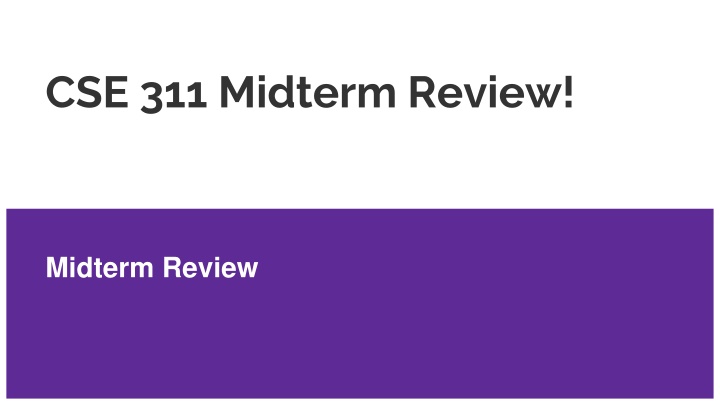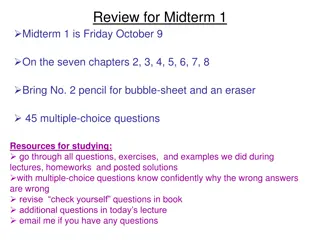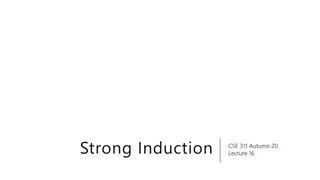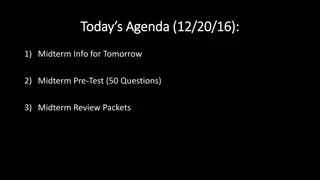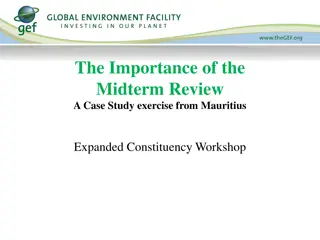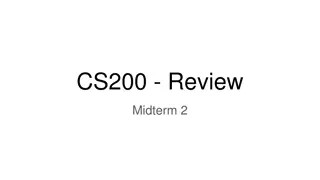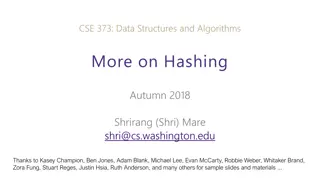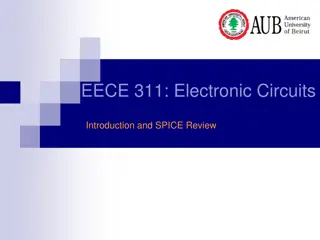CSE 311 Midterm Review!
This content includes information about the CSE 311 midterm review, exam details, set theory problems, and a proof on set identities. It also highlights announcements and reminders for the exam session. Prepare effectively for the upcoming exam and make use of the provided resources.
Download Presentation

Please find below an Image/Link to download the presentation.
The content on the website is provided AS IS for your information and personal use only. It may not be sold, licensed, or shared on other websites without obtaining consent from the author.If you encounter any issues during the download, it is possible that the publisher has removed the file from their server.
You are allowed to download the files provided on this website for personal or commercial use, subject to the condition that they are used lawfully. All files are the property of their respective owners.
The content on the website is provided AS IS for your information and personal use only. It may not be sold, licensed, or shared on other websites without obtaining consent from the author.
E N D
Presentation Transcript
CSE 311 Midterm Review! Midterm Review
Announcements & Reminders TONIGHT @ 6-7:30 pm in BAG 131 and 154 Please bring an ID (Husky Card or other ID) to the exam. We ll be checking those during the exam. Remember you re allowed one piece of paper of handwritten notes. Please read details on the exams page. Check your email for room assignments
Problem 4- Section 04 Write an English proof, proving the following set identity Let the universal set be u . Prove A B A\B for any sets A, B. Work on this problem with the people around you. (1)Translate the claim to predicate (2)Write out the skeleton
Problem 4- Section 04 Write an English proof, proving the following set identity Let the universal set be u . Prove A B A\B for any sets A, B. Work on this problem with the people around you. (1)Translate the claim to predicate x(x A B x A\B) (1)Write out the skeleton
Lets Write it Out: x(x A B x A\B)
Problem 4- Section 04 Write an English proof, proving the following set identity Let the universal set be u . Prove A B A\B for any sets A, B. Let x be an arbitrary element and suppose that x A B . So x A\B. Since x was arbitrary, we can conclude that A B A\B by definition of subset
Problem 4- Section 04 Write an English proof, proving the following set identity Let the universal set be u . Prove A B A\B for any sets A, B. Let x be an arbitrary element and suppose that x A B . By definition of intersection, x A and x B So x A\B. Since x was arbitrary, we can conclude that A B A\B by definition of subset
Problem 4- Section 04 Write an English proof, proving the following set identity Let the universal set be u . Prove A B A\B for any sets A, B. Let x be an arbitrary element and suppose that x A B . By definition of intersection, x A and x B So by definition of complement, x B So x A\B. Since x was arbitrary, we can conclude that A B A\B by definition of subset
Problem 4- Section 04 Write an English proof, proving the following set identity Let the universal set be u . Prove A B A\B for any sets A, B. Let x be an arbitrary element and suppose that x A B . By definition of intersection, x A and x B So by definition of complement, x B Then, by definition of set difference, x A\B. Since x was arbitrary, we can conclude that A B A\B by definition of subset
Problem 6 - Section 06 (23sp) Work on this problem with the people around you.
Problem 6 Let P( ) be . We show P( ) holds Base Cases: Inductive Hypothesis: Inductive Step: Conclusion: Therefore, P( ) holds for all by the principle of induction
Problem 6 Let P( ) be a(n) = 2n - 1 . We show P( ) holds Base Cases: Inductive Hypothesis: Inductive Step: Conclusion: Therefore, P( ) holds for all by the principle of induction
Problem 6 Let P( ) be a(n) = 2n - 1 . We show P( ) holds for all n 1 by induction on n. Base Cases: Inductive Hypothesis: Inductive Step: Conclusion: Therefore, P( ) holds for all n 1 by the principle of induction
Problem 6 Let P( ) be a(n) = 2n - 1 . We show P( ) holds for all n 1 by induction on n. Base Cases: (n = 1, n = 2) a(1) = 1 = 2(1) - 1 and a(2) = 3 = 2(2) - 1 by definition of a. Inductive Hypothesis: Inductive Step: Conclusion: Therefore, P( ) holds for all n 1 by the principle of induction
Problem 6 Let P( ) be a(n) = 2n - 1 . We show P( ) holds for all n 1 by induction on n. Base Cases: (n = 1, n = 2) a(1) = 1 = 2(1) - 1 and a(2) = 3 = 2(2) - 1 by definition of a. Inductive Hypothesis: Suppose P(1) P(2) P(k) hold for an arbitrary k 2. i.e. a(k) = 2k - 1, a(k - 1) = 2(k - 1) - 1, a(k - 2) = 2(k - 2) - 1, etc. Inductive Step: Conclusion: Therefore, P( ) holds for all n 1 by the principle of induction
Problem 6 Let P( ) be a(n) = 2n - 1 . We show P( ) holds for all n 1 by induction on n. Base Cases: (n = 1, n = 2) a(1) = 1 = 2(1) - 1 and a(2) = 3 = 2(2) - 1 by definition of a. Inductive Hypothesis: Suppose P(1) P(2) P(k) hold for an arbitrary k 2. i.e. a(k) = 2k - 1, a(k - 1) = 2(k - 1) - 1, a(k - 2) = 2(k - 2) - 1, etc. Inductive Step: Goal: Show P(k + 1): a(k + 1) = 2(k + 1) - 1 Conclusion: Therefore, P( ) holds for all n 1 by the principle of induction
Problem 6 Let P( ) be a(n) = 2n - 1 . We show P( ) holds for all n 1 by induction on n. Base Cases: (n = 1, n = 2) a(1) = 1 = 2(1) - 1 and a(2) = 3 = 2(2) - 1 by definition of a. Inductive Hypothesis: Suppose P(1) P(2) P(k) hold for an arbitrary k 2. i.e. a(k) = 2k - 1, a(k - 1) = 2(k - 1) - 1, a(k - 2) = 2(k - 2) - 1, etc. Inductive Step: Goal: Show P(k + 1): a(k + 1) = 2(k + 1) - 1 a(k + 1) = = 2(k + 1) - 1 Conclusion: Therefore, P( ) holds for all n 1 by the principle of induction
Problem 6 Let P( ) be a(n) = 2n - 1 . We show P( ) holds for all n 1 by induction on n. Base Cases: (n = 1, n = 2) a(1) = 1 = 2(1) - 1 and a(2) = 3 = 2(2) - 1 by definition of a. Inductive Hypothesis: Suppose P(1) P(2) P(k) hold for an arbitrary k 2. i.e. a(k) = 2k - 1, a(k - 1) = 2(k - 1) - 1, a(k - 2) = 2(k - 2) - 1, etc. Inductive Step: Goal: Show P(k + 1): a(k + 1) = 2(k + 1) - 1 a(k + 1) = 2a(k) - a(k - 1) [Definition of a] = 2(k + 1) - 1 Conclusion: Therefore, P( ) holds for all n 1 by the principle of induction
Problem 6 Let P( ) be a(n) = 2n - 1 . We show P( ) holds for all n 1 by induction on n. Base Cases: (n = 1, n = 2) a(1) = 1 = 2(1) - 1 and a(2) = 3 = 2(2) - 1 by definition of a. Inductive Hypothesis: Suppose P(1) P(2) P(k) hold for an arbitrary k 2. i.e. a(k) = 2k - 1, a(k - 1) = 2(k - 1) - 1, a(k - 2) = 2(k - 2) - 1, etc. Inductive Step: Goal: Show P(k + 1): a(k + 1) = 2(k + 1) - 1 a(k + 1) = 2a(k) - a(k - 1) [Definition of a] = 2(2k - 1) - (2(k - 1) - 1) [Inductive Hypothesis] = 2(k + 1) - 1 Conclusion: Therefore, P( ) holds for all n 1 by the principle of induction
Problem 6 Let P( ) be a(n) = 2n - 1 . We show P( ) holds for all n 1 by induction on n. Base Cases: (n = 1, n = 2) a(1) = 1 = 2(1) - 1 and a(2) = 3 = 2(2) - 1 by definition of a. Inductive Hypothesis: Suppose P(1) P(2) P(k) hold for an arbitrary k 2. i.e. a(k) = 2k - 1, a(k - 1) = 2(k - 1) - 1, a(k - 2) = 2(k - 2) - 1, etc. Inductive Step: Goal: Show P(k + 1): a(k + 1) = 2(k + 1) - 1 a(k + 1) = 2a(k) - a(k - 1) [Definition of a] [Inductive Hypothesis] = 2(2k - 1) - (2(k - 1) - 1) = 2k + 1 = 2(k + 1) - 1 [Algebra] [Algebra Conclusion: Therefore, P( ) holds for all n 1 by the principle of induction
Questions? Topics: Translations & Predicate Logic English Proofs Number Theory Set Theory Strong Induction Weak Induction
Thats All Folks! Breathe, you are going to do great!
